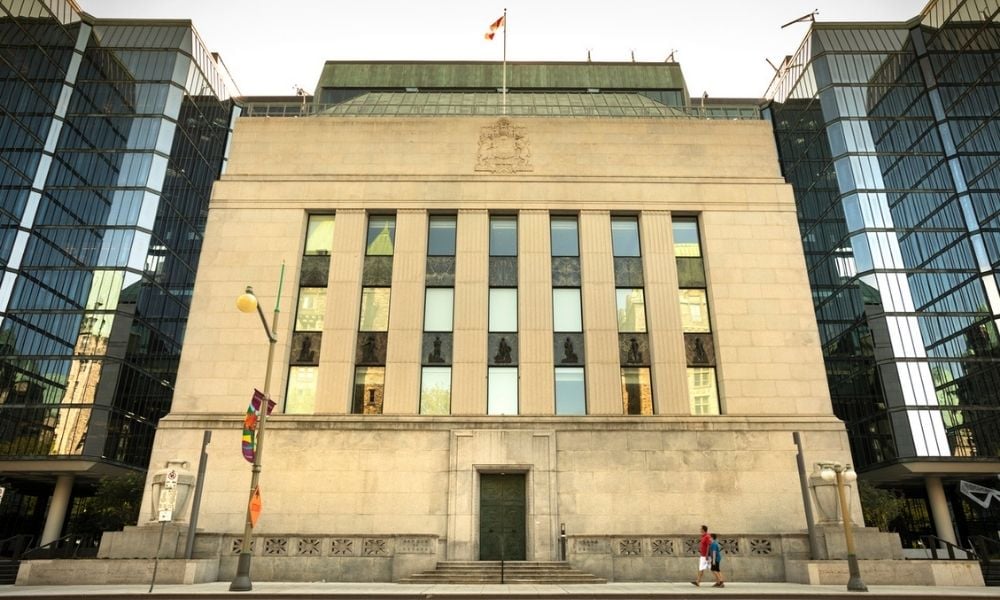Timing remains big question for advisors as Omicron and inflation fails to derail bank's forward guidance

The Bank of Canada’s announcement that it is holding its key interest rate at the rock-bottom level of 0.25 per cent didn’t surprise anyone, least of all the markets, which were already expecting that news.
“It was largely expected that the bank wasn’t going to change its overnight rate, so there wasn’t any big surprise there,” Zach Davidson, an investment advisor and portfolio manager at National Bank Financial Wealth Management in Toronto, told Wealth Professional.
“Their forward guidance is pretty much intact. They still talked about some of the issues as far as a variant, but they also said that the economy has had a very good quarter recently and that momentum continued into the fourth quarter as far as Canada. The B.C. floods could be another issue – there are always going to be issues that concern the Bank of Canada – but it looks like they’re still moving toward raising rates next year, which the market is expecting, and the big question is really the timing of that and when it starts to occur.”
The bank said it was holding its overnight and deposit rates at 0.25 per cent and the bank rate at 0.5 per cent. It is continuing its reinvestment phase and keeping its overall holdings of Government of Canada bonds roughly constant.
The bank said the global economy is still recovering from the pandemic effects, even though the new Omicron variant has renewed uncertainty, prompting many countries to tighten travel restrictions and oil prices to decline.
It said inflation has increased in many countries, reflecting the ongoing supply disruptions, but Canada’s economy grew, as expected, by about 5.5 per cent in the third quarter. That brings its GDP to 1.5 per cent below the last quarter of 2019, before the pandemic began.
The bank also said the economy had considerable momentum into the fourth quarter with recent job gains that brought employment rates back to pre-pandemic levels, though job vacancies remain elevated, wage growth has increased, and housing sales are regaining strength after moderating, But, it added that Omicron and the B.C. floods could still compound supply chain disruptions.
The consumer price index (CPI inflation) remains elevated and the global supply constraints are impacting goods prices, even though gas prices have recently declined. The bank expects CPI inflation to remain elevated in the first half of 2022 and ease toward 2 per cent in the last half of the year. It said that it’s watching inflation and labour costs to ensure “that the forces pushing up prices do not become embedded in ongoing inflation.”
Jordan Damiani, Senior Wealth Advisor at Meridian in the Niagara Region of southern Ontario, said the announcement “was almost a replay of the commentary we saw early in 2021, where they expect inflation to run a bit hotter than their target range and inflation is going to be above target for the first two quarters of 2022, but we see it moderating toward that 2 per cent target in the last two quarters.
“That was the expectation in 2021, when they kept saying there’s going to be transitory inflation as the economy and labour force get back to normal and recover from the pandemic. But, now they think the key theme is that inflation isn’t going to go away anytime soon, and it’s going to spill into 2022.”
Tom Reithinger, a fixed-income portfolio manager with Capital Group, also said it believes the bank will hike rates in Q1 of 2022, which is what the market is expecting, as well.
“The inflationary pressures in Canada are still strong and unlikely to ease significantly unless we see a lockdown due to the Omicron variant, which we find unlikely,” he said. “The risk of overshooting inflation is currently higher than the risk of a lockdown from Omicron.”
None of this means much change for advisors still looking at the clients’ portfolios. Damiani suggested that they ensure they pre-emptively protect retirement portfolios from inflation, especially given that there’s a negative environment for cash and bonds since they have such low rates of return.
The other thing he noted is that some clients are still sitting on the sidelines, waiting for life to return to its pre-pandemic normal. They may be waiting to get back into the market, so Damiani recommended coming up with strategies to ease them back in and continuing to emphasize communication, noting past returns are not indicative of future returns. He also noted small businesses can’t manage the supply chain issues in the same way as the large companies, such as Amazon or Walmart, and portfolios generally contain the large companies.
“The Bank of Canada does not want to derail the economic recovery,” said Damiani. “2022 could potentially be a similar year to 2021 with the same challenges persisting.”



